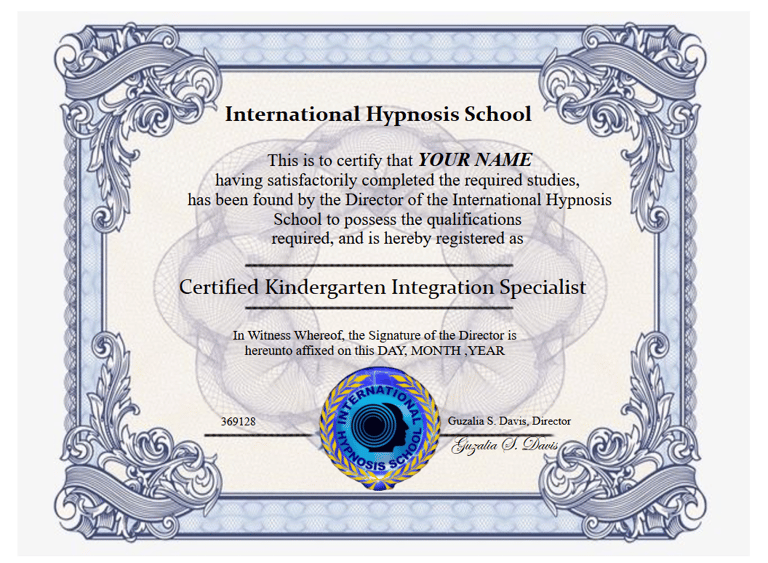Kindergarten Integration Specialist
Support children (and parents) in one of life’s biggest transitions with confidence and heart
Live Zoom Workshop: Saturday, January 17, 2026, 12–2 PM EST
Tuition: $99
Includes Certification + Done-for-You Materials
Prerequisites: Mastery Program In Applied Hypnosis
Enrollment by invitation only

You’ll Learn How To:
✅ Confidently guide young children through the emotional, social, and energetic challenges of starting school
✅ Help parents manage separation anxiety with effective, compassionate tools
✅ Use simple games and child-friendly meditations to build emotional readiness and resilience
✅ Offer professional Kindergarten Readiness Support sessions as part of your practice
This Certification is Perfect For:
Hypnotherapists
Coaches & Energy Workers
Educators & Support Professionals
Holistic Parenting Coaches
Anyone working with young children & families


What’s Included in Your Certification Package
✔️ Practitioner Guide: to help you confidently deliver sessions, structure programs, and market your services.
✔️ Parent Guide: a ready-to-share resource to educate and support parents, perfect for sessions, workshops, or handouts.
✔️ 18 Scripted Games: play-based activities designed for emotional preparation - ideal for private sessions, group workshops, or classroom integration.
✔️ 19 Hypnotic Fairy-Tale Style Scripts for Children: Short, soothing guided journeys - perfect for bedtime, transitions, or calming moments during the school day.
✔️ 6 Hypnosis Scripts for Parents: Support parents through their own transition with gentle, regulating hypnotic experiences.
✔️ 2-Hour Live Zoom Training
✔️ Certification: Kindergarten Integration Specialist: Receive your certificate upon successful completion of the written exam.
✔️ Commercial License Included: Use all materials in your work with clients - including live sessions, workshops, and creating commercial audio/video recordings.
Why you will love this training:
Whether you work with children directly, support parents, or teach wellness skills to groups - this training gives you plug-and-play tools that can be immediately integrated into your practice.
You'll walk away with a fully built toolkit you can use to:
Offer 1-on-1 Support Sessions: Use the materials as part of a single powerful session or design a multi-session program helping families prepare emotionally, mentally, and energetically for kindergarten.
Guide parents and kids through school prep step by step
Address separation anxiety, social skills, and sleep routines
Provide practical tools + calming support
Facilitate Group Workshops: Run local or online workshops for small groups of parents, kids, or both.
Use the therapeutic games for playful group interaction
Lead story-style meditations to help children relax and process emotions
Teach calming skills parents can use at home
Deliver Public Presentations: Expand your visibility and authority by offering free or paid presentations for schools, day-cares, or parenting groups.
Educate families on kindergarten readiness
Demonstrate easy tools and games that reduce stress
Position yourself as a trusted local expert
Create Your Own On-Demand Program: Package the materials into a digital offering - a mini course, membership bonus, or parenting resource bundle.
Sell or gift recordings of meditations and games
Record videos using the scripts and guide content
Use certification to boost your program’s credibility
Add a New Niche Offering to Your Practice: If you’re a coach, healer, educator, or hypnotherapist, this training opens up a new service line with zero content creation needed.
Start working with families and kids - even if you never have before
Be known as the go-to practitioner for school transition support
Increase your income with seasonal offerings year after year
Done-for-You, Ready to Use:
No extra prep needed
Materials designed for client-facing use
Aligned with trauma-informed and family-centered values
Adaptable for spiritual or secular audiences
Make a lasting impact in early childhood development: The first school experience sets the tone for a child’s learning journey. Help make that transition smoother, safer, and more connected - for the whole family.
Become a Kindergarten Integration Specialist and bring calm, clarity, and confidence to this pivotal moment.
Income Paths as a Kindergarten Integration Specialist
This certification gives you a marketable niche that:
Requires no additional tools or investments
Is relevant every year during school season (August–September, January, and Spring)
Appeals to both conscious parents and schools seeking wellness workshops
Example Income Paths:
1:1 Parent Support Sessions
Group Workshop (in person/Zoom)
Pre-recorded program access
School/Daycare presentation:
Format:
Live Zoom workshop on January 17, 2026, 12–2 PM EST
Interactive training and Q&A
Tuition: $99
Why This Work Matters
Starting school is one of the biggest emotional transitions in a child’s early life - and one of the most stressful times for families.
Children’s brains are still developing core nervous system patterns
Separation anxiety can disrupt sleep, eating, and emotional regulation
Parents often feel helpless, unsure how to support without overwhelming
While many systems focus on academic readiness, emotional preparedness is just as vital - if not more.
Did You Know?
61% of parents report their child has anxiety or fear about starting kindergarten
Children with secure emotional transitions show higher academic success and social development by 3rd grade (Harvard Center on the Developing Child)
Unaddressed early anxiety can result in long-term stress patterns, school resistance, or behavioral challenges later on
But here’s the truth: most families are not receiving this kind of support - and practitioners trained to offer it are rare and in demand.
Most Common Questions Asked:
Q: How can I integrate kindergarten readiness coaching into my existing practice without overwhelming families?
A: The training is designed to fit seamlessly into what you already do. You’ll learn how to add readiness strategies through short, play-based activities that complement — not complicate — family life. Parents walk away feeling empowered, not burdened.
Q: What age range is ideal to start working on kindergarten readiness skills?
A: Most children benefit from gentle readiness support between ages 3–5. However, many strategies can be adapted for younger preschoolers and even early elementary children who may need extra support transitioning into school routines.
Q: How do I explain the value of this service to parents who think school alone will prepare their child?
A: You’ll gain language to confidently explain that readiness isn’t just about academics — it’s about emotional resilience, independence, and social confidence. Schools teach, but preparation at home eases the transition, prevents struggles, and sets children up for long-term success.
Q: What are the ethical boundaries between coaching/consulting and “teaching school” skills?
A: This program emphasizes developmental readiness, not duplicating school curriculum. You’ll be supporting parents in building confidence, routines, and age-appropriate skills — always staying within a coaching and guidance role.
Q: How do I keep activities playful instead of parents pushing too hard on academics?
A: You’ll be equipped with a library of play-based strategies that make learning natural and fun. We focus on curiosity, exploration, and imagination — so readiness feels like playtime, not pressure.
Q: What tools or resources should I provide to parents to support home practice?
A: You’ll receive done-for-you resources — guide, games suggestions, scripts that can be read by parents just like any storybook— that you can share with families. This makes it easy for them to practice at home without feeling like they’re running a classroom.
Q: How do I price and package kindergarten readiness support so it’s accessible but sustainable?
A: You’ll receive clear guidance on different pricing models — from group workshops to 1:1 coaching packages. We’ll discuss how to balance affordability with the value of your expertise so families feel supported and you’re compensated fairly.
Q: Can I collaborate with local schools or preschools to offer this program?
A: Absolutely. Many practitioners build partnerships with preschools, childcare centers, and even pediatric offices. We’ll explore collaboration strategies to expand your reach and credibility in your community.
Questions Commonly Asked by Parents
Q: How do I know if my child is truly ready for kindergarten?
A: Readiness isn’t about perfection — it’s about confidence in everyday skills like following routines, expressing needs, and feeling safe in a group. You’ll learn how to spot the signs that your child is ready and how to support them if they need extra time in certain areas.
Q: What specific skills should my child have before starting school?
A: Beyond knowing letters or numbers, readiness includes social and emotional skills: sharing, listening, following directions, using the bathroom independently, and managing feelings. We’ll cover the full picture so you don’t miss what matters most.
Q: My child is shy/active/attached to me — will that make kindergarten harder?
A: Every child has their own temperament, and none of these traits mean your child will “fail” at kindergarten. You’ll learn strategies to help shy kids feel safe, active kids channel their energy, and attached kids gain independence step by step.
Q: Should I be teaching letters and numbers now, or focus more on social skills?
A: Social and emotional readiness lays the foundation for academic success. A child who can take turns, listen, and feel confident in class will learn faster when academics come. Letters and numbers matter, but relationships and routines matter more at this stage. Besides, it's not "or" - it's "and."
Q: How much daily time should I spend on “school readiness” activities?
A: Just a few minutes woven into daily life makes a huge difference. You don’t need hours of “lessons.” Everyday routines — mealtime, play, and bedtime — are perfect opportunities to build readiness naturally.
Q: What’s the difference between preschool and kindergarten readiness?
A: Preschool provides group learning, but readiness coaching focuses on the bridge into kindergarten — helping your child handle big emotions, gain independence, and thrive in a structured school environment.
Q: How do I help my child adjust emotionally to being away from home all day?
A: We’ll share playful rituals, gentle separation strategies, and confidence-building activities. The goal isn’t to eliminate all worries but to equip your child with coping tools that make the transition smoother.
Q: What if my child doesn’t listen to the teacher or struggles with group rules?
A: That’s very common at this age. You’ll learn proactive ways to practice listening, patience, and following directions at home — so your child enters school already familiar with those expectations.
Q: Are there playful ways to build independence (like dressing themselves, lunch routines)?
A: Yes! Readiness grows best through play and practice. Simple games, role play, and daily routines can help your child gain independence without it feeling like “work.”
Q: How do I balance preparing my child without putting pressure on them?
A: The key is keeping readiness fun and lighthearted. We’ll show you how to use curiosity, stories, and games instead of drills — so your child feels excited, not stressed.
Q: What if my child falls behind compared to other kids?
A: Children develop at different paces, and “behind” often just means “on their own timeline.” You’ll learn how to support your child where they are, celebrate progress, and know when extra support might be helpful.
Q: My child resists structured activities — how do I still prepare them?
A: Structure doesn’t have to mean sitting still at a desk. We’ll give you playful, movement-based activities that prepare your child while respecting their natural energy and learning style.
Q: Do I need to buy workbooks and flashcards, or is play enough?
A: Play is the most powerful way young children learn. You’ll discover how everyday play and conversations build the exact skills your child needs — no flashcards required.
Q: What are some red flags that I should get extra help before kindergarten starts?
A: Signs like extreme difficulty with communication, inability to separate from parents at all, or very limited social interaction may suggest your child needs additional support. We’ll cover what to watch for — and how to get help early if needed.
HAPPY STUDENTS


